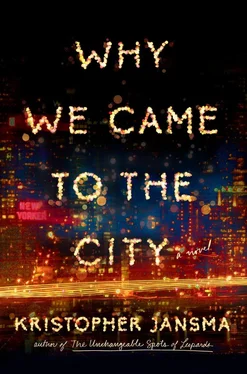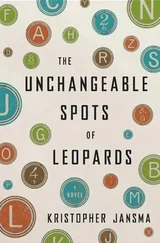The woman’s great gray head swayed from side to side and her tongue clucked behind fuchsia-painted lips.
“Oh dear,” they all seemed fond of saying, as they reached for their telephones, “let me just call someone and see about this.”
The problem was the question marks. Irene was full of them. Allergic reactions to medications: ? Name of previous primary care physician: ? List previous hospital visits, in order, and by purpose: 1. Tonsils removed, 1992 or 1991? 2. Fell down and hit head on a brass Dalmatian statue. I was 5 or 6? No concussion. 3. Horrible stomachaches, turned out to be lactose intolerance, which went away suddenly. Not sure when. Immunizations and vaccinations: Probably all the standard ones for kids? Nothing after 1998. Father’s medical history: Male-pattern baldness, rosacea, near-sighted,??? Mother’s medical history: ???
“I have primary bone cancer.” She tried to get used to the way these words felt on her tongue, and she’d point to the small lump below her left eye socket. “I have a malignant osteosarcoma.” It wasn’t at all noticeable until you noticed it.
The day passed in excruciating baby steps. By the time darkness fell, Irene had visited practically every floor in the hospital, never once escaping the sight of glittering snowflakes.
Finally cleared to begin her first two-day chemo dose the following morning, Irene walked across the dark street and broke down crying in the back corner of a MetroStop Bakery over a bowl of scalded corn chowder. None of the servers seemed to find this odd. She looked down at the mascara smudges she’d left on the edge of the paper tablecloth. She’d expected to get a bit farther than this . She hadn’t even seen a single needle, scalpel, or IV! To quiver in the face of medieval instruments seemed reasonable; to be undone by grainy Xeroxes did not. At eight a.m., she was to report to the twelfth floor for chemotherapy, which would take a few hours to be infused through a vein in her arm.
Irene waited for the mascara stains to dry a little. Then she carefully tore a perimeter of paper around them and slipped the scrap into her purse, not yet sure how or if she’d use it in some new piece she’d been constructing late at night in her apartment.
While her fingers were in her purse, they pulled out her phone, even as she forbade them to do it. Everyone’s gone for the holidays, she reminded them. Still, they thumbed through her contacts. Sara was at George’s parents’ place in Ohio for Christmas. Jacob was in Tampa, or as he called it, “the land of decrepitude,” with his mother and father for the final few days of Hanukah. She hadn’t wanted to ruin anyone’s holidays, so she hadn’t told any of them about her diagnosis yet.
The only person who knew was William Cho. Irene studied his picture. Her phone had downloaded it on its own, from where she didn’t know. Dressed in a black suit and black tie, William looked somewhat startled against a blue Sears background. She wished she knew how to change it; this puzzled man was nothing like the delicate and curious boy she’d spent the night with a few days ago. The more she looked at this un-William, the more she wanted to see the real one again. She had bought him that Dylan scarf, but it was still back in her apartment. They hadn’t spoken since the last time she’d sat in this same café right after the diagnosis.
He would probably still be in the city; his parents lived in Queens. She tapped the star key every so often to keep the screen from going dark and taking him away.
• • •
867 Video was dead, and from the owner’s stares, William got the distinct impression that he was the sole reason the store hadn’t closed up yet. Perhaps William was keeping it open in a larger sense as well, for the trend among his coworkers was to have DVDs — no, Blu-rays now — conveniently delivered to their doors, or better yet, streamed to their TVs. “How do you have time to go to a store?” they asked him at work, when they saw his rentals sitting on his desk waiting to be brought back. “Didn’t they all close?”
But William had nothing but time to go to the store, even so close to Christmas. Especially now, as his office was closed. He loved stores because he never knew what he wanted. He had to touch everything until his fingers selected the right one, generally without his permission. He was doing just this when his phone rang.
The owner, Arturo, whose left eye was lifeless and listing, called out to William as he set down the copy of Alfred Hitchcock’s Suspicion so he could answer the call.
“Forty-nine cents I got that for! Not a scratch on the disc! Stupid teenagers that ran the Blockbuster on Seventy-eighth Street didn’t even know who Cary Grant was. I told them, ‘This is an American god, you cretins! This man could act circles around your Bin Diesel, your Channing Tater, your Catrina Gomez!’”
Expecting a call from his mother, William answered the phone without glancing at the screen.
“ Annyeonghaseyo, eomeoni .”
“William? Is that you?”
At the sound of Irene’s voice, he gripped the rack of classics unsteadily.
“William,” she continued cheerfully. “Sorry to bother you. I’m sure you must be busy right now, but I was hoping I could ask you a favor.”
“No,” he said quickly. “I mean, no, it isn’t any bother. How are you feeling?”
“I’m feeling fine. No change. But it’s my building. Practically in the middle of the night, the super came around just now to tell us we have to e vac uate because of some kind of infestation. Pill flies or sharp beetles or something like that. Thank god it’s not bedbugs, but anyways, I just ran out — stupid me — without packing a thing, and I’m terrified to go back. Everyone’s out of town, and I need a place to sleep if it’s not too much to ask. Just on the couch or somewhere, I’m not picky. I don’t want you to think I have the wrong idea —”
Wrong idea? William wanted to ask. Which idea was wrong, exactly? The idea of them sleeping together again? Or the equally ineradicable idea that they were nothing more than two more people who ought never to have slept together in the first place? He kept his mouth shut, which was about all he trusted himself to do.
“I know that things have been — well, I don’t know what they’ve been. Sorry for babbling on like this. I know it’s — shit.”
“No,” William blurted. He instantly wished he’d just let her keep going; he wanted nothing more than her babbling on and on. But now she’d fallen silent and clearly expected him to say something. Panicked, he stared down at Cary Grant on the Suspicion DVD cover. Each time they kissed, the tagline read, there was the thrill of love… The threat of murder! Cary Grant’s lowered eyebrows bespoke a smoothness that William wished he possessed.
“Good,” he said, trying to sound Grant-like, “I’ll let the doorman know you’re coming.”
“William, you’re the best,” she sighed.
“Don’t mention it,” he said, lifting the DVD.
Irene sighed happily and ended the call.
William texted his address to her phone and then rushed over to Arturo with the DVD in hand, hoping that if he hurried, he might be able to study a scene or two before Irene buzzed up.
“One of Hitchcock’s best,” Arturo said, looking adoringly down at Joan Fontaine in her low-cut red dress. “Except for the ending, which RKO made him change—”
But William could hardly hear him. He paid and left the store, thinking at first he’d buy some of the Bollinger Blanc she’d liked last time — or get a bouquet of roses that he could throw into a vase, only he didn’t think he owned a vase — and moreover, this wasn’t what Cary Grant would do, he was fairly certain. Cary Grant would never be so presumptuous. She said she didn’t want him to think she had the wrong idea. Whatever else, that probably meant he ought to play it cool. Cool like Cary Grant.
Читать дальше












